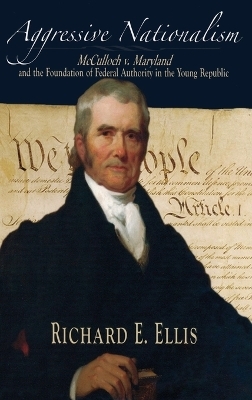
Aggressive Nationalism
Oxford University Press Inc (Verlag)
978-0-19-532356-6 (ISBN)
Almost all treatments of the case consider it from the vantage point of Chief Marshall's decision in which he famously declared the act creating the Second Bank of the United States constitutional and Maryland's attempt to tax it unconstitutional. Yet a careful examination of the context in which the case emerged reveals other, even more important issues involved that Marshall chose to ignore: the private profit making nature of the Second Bank of the United States; the power of the Bank to create branches in the states without their consent, which many people viewed as a direct assault upon the sovereignty of the states; and the differences between a tax levied by a state for the purposes of raising revenue and one which was meant to destroy the operations of the branches of the Bank.
Addressing these issues most likely would have undercut Marshall's extreme nationalist view of the constitution, and his unwillingness to adequately deal with them produced immediate, widespread, yet varied dissatisfaction among the States. These issues are particularly important as the Supreme Court was forced to rehear them in Osborn et. al. v. Bank of the United States (1824) and they also formed the basis for Andrew Jackson's famous veto for the re-chartering of the Bank in 1832.
Not only the first in-depth examination of McCulloch v. Maryland, but also a new interpretation of this familiar and landmark decision, this sharply argued book provides much new information and fresh insight into a source of constant division in American politics, past and present.
Richard E. Ellis is Professor of History at the University of Buffalo, SUNY. Among his published works are The Jeffersonian Crisis: Courts and Politics in the Young Republic (1971) and The Union at Risk: Jacksonian Democracy, State's Rights, and the Nullification Crisis (1987). He has held grants from The John Simon Guggenheim Foundation, the National Endowment for the Humanities, and the American Council of Learned Societies.
Introduction ; 1. The United States Supreme Court vs.the States ; 2. The Second Bank of the United States ; 3. The States vs. the 2BUS ; 4. McCulloch v. Maryland ; 5. Virginia's Response to McCulloch v. Maryland ; 6. Ohio and the Bank of the United States ; 7. Ohio and Georgia before the United States Supreme Court ; 8. Coda ; Endnotes ; Index
| Erscheint lt. Verlag | 16.8.2007 |
|---|---|
| Verlagsort | New York |
| Sprache | englisch |
| Maße | 226 x 157 mm |
| Gewicht | 522 g |
| Themenwelt | Geschichte ► Teilgebiete der Geschichte ► Militärgeschichte |
| Recht / Steuern ► EU / Internationales Recht | |
| Recht / Steuern ► Rechtsgeschichte | |
| Recht / Steuern ► Steuern / Steuerrecht | |
| Recht / Steuern ► Wirtschaftsrecht ► Bank- und Kapitalmarktrecht | |
| ISBN-10 | 0-19-532356-4 / 0195323564 |
| ISBN-13 | 978-0-19-532356-6 / 9780195323566 |
| Zustand | Neuware |
| Haben Sie eine Frage zum Produkt? |
aus dem Bereich


